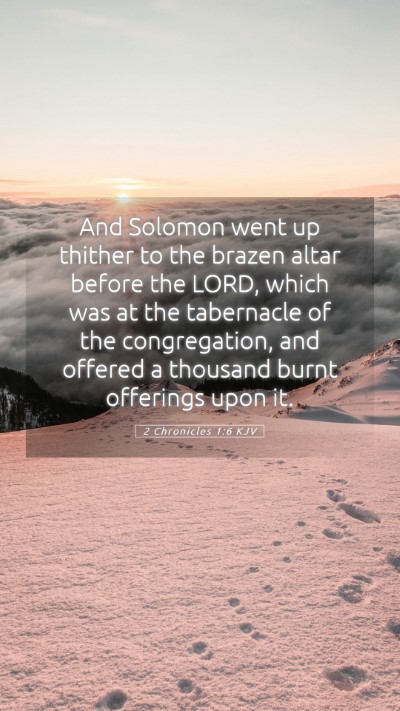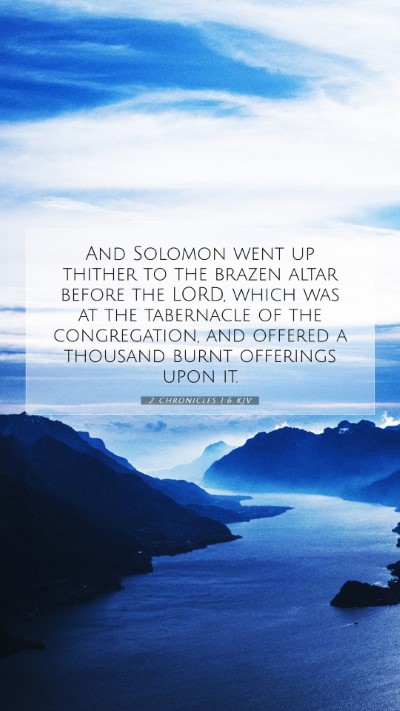Understanding 2 Chronicles 1:6 - Bible Verse Meaning and Commentary
The verse 2 Chronicles 1:6 presents a pivotal moment in the early reign of Solomon. The passage captures the essence of his character and the foundation of his leadership. This commentary combines insights from renowned public domain sources including Matthew Henry, Albert Barnes, and Adam Clarke, providing a comprehensive understanding of this verse.
Verse Text
"And Solomon went up thither to the brasen altar before the Lord, which was at the tabernacle of the congregation, and offered a thousand burnt offerings upon it."
Verse Analysis
This passage reflects several key themes that are vital in the interpretation of Scripture:
- Solomon’s Devotion: The act of offering a thousand burnt offerings demonstrates Solomon's deep spirituality and commitment to honoring God.
- Sacrifice and Worship: The use of the altar indicates recognition of the need for sacrifice and worship in approaching God, paving the way for divine interaction.
- Seeking Divine Guidance: Solomon’s actions express his desire for wisdom and understanding as he leads the nation, showing reliance on God’s providence.
Commentary Insights
Matthew Henry’s Commentary
Henry emphasizes the significance of Solomon's approach to God at the beginning of his reign. He notes that Solomon did not rely solely on his resources or power but recognized the necessity of divine favor and guidance. The numerous offerings suggest not only a heart filled with reverence but also an understanding of the importance of atonement before a holy God.
Albert Barnes’ Notes
Barnes sheds light on the cultural and historical context of burnt offerings, detailing how they were essential for expressing allegiance and devotion to God in ancient Israelite society. He notes that Solomon's extensive offerings were an indication of his readiness to submit to divine authority and desire for God's presence to lead him.
Adam Clarke’s Commentary
Clarke discusses the symbolism of the altar as a meeting place between God and man, pointing out that it is here that offerings were made to atone for sins and seek blessings. He also highlights the significant number of sacrifices made by Solomon, suggesting it reflects not only personal devotion but a public declaration of faith, which would set the tone for his reign.
Theological Significance
2 Chronicles 1:6 serves as an exemplary template for spiritual leadership, demonstrating that effective governance is anchored in humility and the seeking of divine wisdom. The act of sacrifice is a reminder that true leadership requires dependence on God’s will.
Application to Daily Life
For modern readers, this verse prompts reflection on our own dedication to God. It encourages individuals to consider how they approach God in prayer and worship:
- Are we willing to set aside personal desires in pursuit of God's guidance?
- Do our acts of worship reflect true devotion and sacrifice?
- How can we incorporate prayer for wisdom in our daily decision-making processes?
Cross References
- 1 Kings 3:4: Solomon’s prayer for wisdom at Gibeon.
- 2 Chronicles 7:1-3: God's response to Solomon’s offerings in fire.
- Psalm 51:17: The importance of a broken spirit and contrite heart as acceptable sacrifices to God.
Conclusion
In summary, 2 Chronicles 1:6 stands as a profound narrative about the character of Solomon at the onset of his reign, emphasizing the fundamental aspects of sacrifice, worship, and the quest for divine wisdom. This analysis provides insights for anyone engaging in Bible study or seeking Bible verse explanations relating to their spiritual journey.
Further Exploration
Those interested in delving deeper into the meaning of Bible verses can explore additional resources such as:
- Online Bible study platforms.
- Bible study guides that include historical context and application.
- Discussion in Bible study groups focusing on learning from the life of Solomon.


